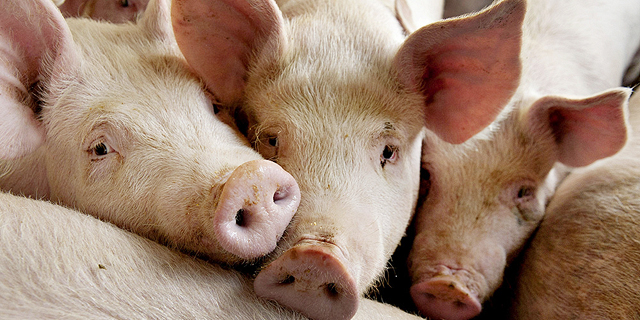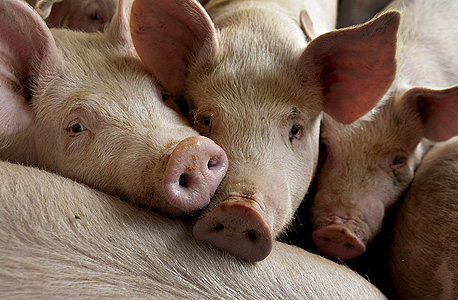
Israeli Rabbi Says Lab-Grown Pork Meat Is Kosher
Abstinence from eating pork is a pinnacle of Jewish religious dietary laws, which also prohibit the consumption of meat and dairy together
Pork meat would be kosher if it were “grown” in a lab, Israeli Modern Orthodox Rabbi Yuval Cherlow told Calcalist on Sunday. Mr. Cherlow addressed the issue at a panel on kosher food and genetic modification on Thursday at Bar-Ilan University near Tel Aviv. According to Mr. Cherlow, existing kosher laws could not be applied to lab-grown meat, since, well, it was never alive.
For daily updates, subscribe to our newsletter by clicking here.
Jewish religious law prohibits consumption of pork, shellfish, and the eating of of meat and dairy products together. Kosher laws also dictates the manner in which animals should be slaughtered and the way meat is processed. Technological advancements in the field of genetic modification and synthesized foods are pressing religious leaders to reevaluate, and at times, redefine these long-standing traditions.
A formal religious ruling on this issue could have a significant financial implication on the cultured meat industry, as the global kosher food market supports a multi-billion dollar industry, and the global halal market is estimated to become a multi-trillion dollar industry in the coming decade.
Mr. Cherlow is not alone in this reasoning. In 2013, Rabbi Menachem Genack, who heads the kosher certification division at the New York’s Orthodox Union, addressed the religious implications of lab-grown meat following the reveal of the world’s first cultured beef hamburger, developed that year by Maastricht, Netherlands-based company Mosa Meat. Mr. Genack said there is no religious restriction on eating a lab-produced hamburger with cheese or dairy products. Also in 2013, prominent Israeli Rabbi Shlomo Aviner said that lab-grown meat should not be considered a meat product, and could, therefore, be consumed with dairy.
More stringent Jewish law scholars do not differentiate between lab-cultured pork and other meats from traditional animal products, saying kosher laws are to be applied to these foods regardless of the way they were created.
Global demand for meat is projected to double by 2050, according to the UN Food and Agriculture Organization.
Since the first lab-grown hamburger was digested in 2013, other companies have attempted to turn lab-cultured meat, or believable meat substitutes, into a viable food source and business model. These companies include El Segundo, California-based Beyond Meat and Redwood City, California-based Impossible Foods which are developing plant protein-based meat products that taste and “bleed” like real meat, and New York-based early stage biotechnology startup Finless Foods Inc., which is aiming to develop and mass manufacture lab-cultured alternatives to conventionally caught and commercially farmed seafood. San Francisco-based Memphis Meats, which produces beef, chicken and duck products by culturing animal cells, released the world’s first cultured meatball in February 2016 and the world’s first cultured poultry in March 2017.
Cultured meat companies say their products reduce exposure to food-borne illnesses and reduce pollution and water consumption. Tel Aviv-based cultured chicken company SuperMeat says its products require 99% less land and 98% less water than conventional meat products and emit 96% fewer greenhouse gases.
Mr. Cherlow is a Modern Orthodox rabbi and an authority on Jewish law. He heads the ethics department of the Tzohar rabbinical organization in Israel, and regularly advises on issues pertaining to Jewish religious law, often voicing liberal-leaning attitudes.
Related stories
“There is a deeply religious and moral motivation to develop food-based on genetic research,” he said.
The cultivation of meat from single cells is a meaningful new technology, Mr. Cherlow said, due to its positive environmental impact and its potential ability to feed a growing population as the world’s food resources are dwindling. “Genetic engineering is important because meat production is one of the biggest polluters in the world and consumes a great deal of natural resources, such as water and land, and because of the moral problems of mass production of meat,” Mr. Cherlow said.
“Based on Jewish religious law, when you use a cell from a pig and use it to produce food, the cell loses its original identity and therefore cannot be defined as a forbidden food,” Mr. Cherlow said. “It cannot even be defined as meat.” Based on this principle, Mr. Cherlow said, there should not be a restriction on pairing lab-grown meat with dairy.

6 Comments Add Comment